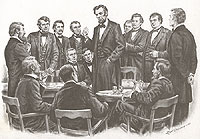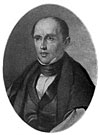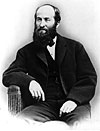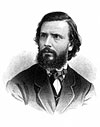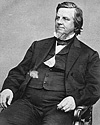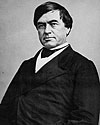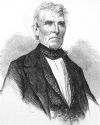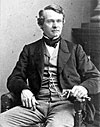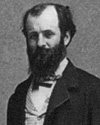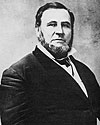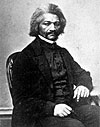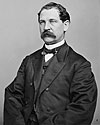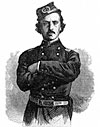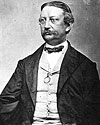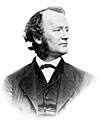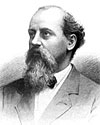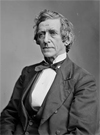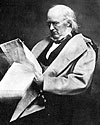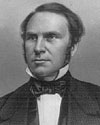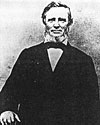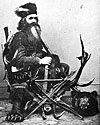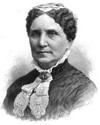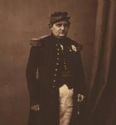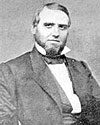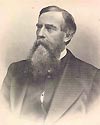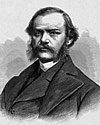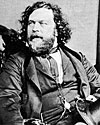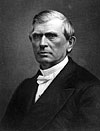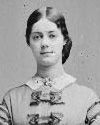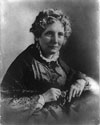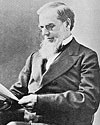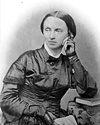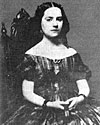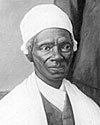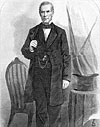Among the visitors to the White House were many politicians and office-seekers. Although Mr. Lincoln seldom read the newspapers, some of the regular visitors were journalists. Some of them were family friends—like Noah Brooks. Some were also prominent Republican leaders—like John Forney, Alexander McClure, Henry Raymond and Thurlow Weed. William Stoddard wrote that the president liked certain journalists to visit:
There is a limited list who privilege themselves to come here whenever they see fit. They come when news is scarce, with a hope of having some found or invented for them. They come when news is plentiful, for they intensely represent the excited and hungry public, and they are anxious to assure themselves that they have learned all there is to be learned. The President himself likes to have them come, and meets them cordially. Among them are a number of remarkable men, young or old. Probably they have no idea how much they tell him, or how through them, as if through so many human magnetic wires, he receives message after message from the current thought and purpose of the popular masses whom he understands so much better than they do.
That wiry, sallow, silent-stepping gentleman, who has just come over here after a visit to the President’s rooms, is Mr.[Lewis] Gobright, the agent and representative of the Associated Press, the censor of all war rumors, and the condenser of all unofficial news dispatches. He knows a great deal, and he looks as if he knew everything and wished only to ascertain whether or not your own knowledge and understanding are accurate. That is all he came for, and he may have found the President fairly well advised of the condition of things. If not, he has set him right, as a duty, but he will rarely tell you or any other mere private citizen of any news-error he may find you falling into. He will hear what you have to say, however, with extreme courtesy. His entire face is critical, but confidential and trustworthy and secret-keeping, and he is an epitome of the entire reporting science and art….That young-looking woman out yonder…is not exactly a reporter, but she is an enthusiastic war correspondent, and she, and others more or less like her, come up here frequently to gather materials for present and future letter-writing.1
“I have nothing new,” President Lincoln told reporter Lawrence A. Gobright when he inquired about news from the Vicksburg front in 1863. Typically, he enjoyed journalists’ company so Mr. Lincoln continued: “I am much concerned about affairs. I can’t sleep tonight without hearing something; come, go with me to the War Department. Perhaps Stanton has something.”2 Indeed, the President enjoyed their company. “I am always seeking information,” he told a group of journalists he asked to come to the White House. “You newspapermen are so often behind the scenes at the front I am frequently able to get ideas from you which no one else will give.”3
Journalists like Henry Villard were sometimes called to the White House to report on a particular battle; the New York Tribune’s Henry Villard was escorted to the White House by Senator Henry Wilson after he returned to Washington after the Battle of Fredericksburg. The Tribune’s Henry Wing had an even more memorable experience after The Battle of the Wilderness. He arrived in Washington via a special railroad car, Wing later wrote: “….about two o’clock in the morning I reached the White House, where the President had gathered his official family to meet me. As I stepped into the room where they were seated my glance caught a quick gleam of surprise and apprehension in Mr. Lincoln’s eyes, and I was awakened to a sense of my disreputable appearance. My hair was disheveled, my shabby old coat was dusty and wrinkled, my pantaloons, much too long, were folded back at the bottom and gathered about my ankles with pieces of cotton twine, and my coarse clothes were coated three or four layers thick with ‘sacred soil.'” After appraising the Cabinet of the situation at the Union front, Wing told the President he had a ‘personal word” for him:
The others withdrew and he closed the door and advanced toward me. As he stood there I realized as never before how tall he was. I looked up into his impressive face, ready to deliver Grant’s message. He took a short, quick step toward me, and, stooping to bring his eyes level with mine, whispered in tones of intense, impatient interest, ‘What is it?'”
“I was so moved that I could hardly stammer: ‘General Grant told me to tell you, from him, that whatever happens, there is to be no turning back.”
The vision that opened through those wonderful eyes from a great soul glowing with a newly kindled hope is the likeness of Mr. Lincoln that I still hold in my memory. And the hope was never to be extinguished. Others had ‘turned back.’ Every other one had. But there had come an end of that fatal folly.
Mr. Lincoln put his great, strong arms about me and, carried away in the exuberance of his gladness, imprinted a kiss upon my forehead.4
Other visitors were sub-cabinet officials like Charles A. Dana of the War Department, Gustavus Fox of the Navy Department and Frederick Seward of the State Department. The President frequently broke protocol to deal directly with officials he liked or needed. In the case of someone he liked like naval officer John A. Dahlgren, Mr. Lincoln’s favoritism could cause friction with their superiors. Mr. Lincoln also used non-governmental officials to get information about government officials on whom he wanted to check. Dana was used in that capacity in 1863 to check on General Ulysses S. Grant before Dana was made assistant secretary of war and Grant a lieutenant general. In 1864, other friends of Mr. Lincoln were used to determine Grant’s political ambitions.
President Lincoln could use such missions to draw politicians closer to him. Shortly before his second inauguration in 1865, President Lincoln sent Thurlow Weed to visit Hugh McCulloch, whom Mr. Lincoln was considering for appointment as secretary of the treasury. “I found myself not a little embarrassed on my way, one Sunday morning to the resident of Mr. McCulloch,” Weed later wrote. “The idea of establishing relations with that gentleman ‘on compulsion’ seemed like seeking knowledge under difficulties. These difficulties, however, disappeared by degrees as our conversation proceeded. There were two elements in the character of Mr. McCulloch, on which, per se, I was disposed to rely. He had Scotch blood in his veins, and had been in politics a Whig. My interviews with that gentleman, if protracted, were made so by his intelligent, right-minded, and straight-forward expression of views and opinions. If, in going to Mr. McCulloch, I had something the feeling of Toots in calling on Captain Cuttle for the ‘favor of his friendship,’ I left him with a strong feeling of regard and confidence, and so reported to Mr. Lincoln, who immediately sent his name to the Senate—a step which neither Mr. Lincoln nor the people have had occasion to regret.”5
Some visitors never spoke to the President. For example, poet Walt Whitman never actually met Mr. Lincoln but often observed him from afar. He asked John Hay for a railroad pass so he supposedly could help in the 1863 election in Brooklyn. Arriving at the White House, Whitman saw the President ‘talking to a gentleman, apparently a dear friend. His face & manner have an expression & are inexpressibly sweet-one hand on his friend’s shoulder, the other holds his hand. I love the President personally.”6
Not everyone who met Mr Lincoln was impressed. After meeting President Lincoln, Prince Napoleon observed: “What a difference between this sad representative of the great republic and her founding fathers! He is a second-choice president whom they nominated after failing to agree on weightier men. I am afraid that standards…have slipped. Mr. Lincoln is a good man, but one without greatness nor very much knowledge, an Illinois lawyer after first have been a carpenter I think.”7
But many of those who met President Lincoln did come away impressed. A previously contempuous abolitionist, a repentant Jane Grey Swisshem later wrote of her visit: “ His evident weariness, and the patience with which he stood shaking hands, as one might pump on a sinking ship, made me angry with the senseless custom. Were there not enough demands on his time and strength, without this unreasonable drain? I hesitated about being presented, because it would be another hand for him to shake, but felt I could not go away without yielding what was counted a token of respect and protesting against the custom. So when he took my hand I said : ‘May the Lord have mercy on you, poor man; for the people have none !’ He threw up his head and laughed pleasantly, and those around him joined the laugh ; but I went off angry, indignant, that he should be sacrificed to a false social custom an insolent demand of thoughtless people, and vain people, who added this burden to that of an already cruelly overtaxed public servant.” 8
Some were deeply moved. Chicago’s Mary Livermore noted at one White House reception: “A poorly dressed, humpbacked woman approached whose face had that rare spiritual beauty often seen in connection with this deformity. Her lustrous eyes looked up almost adoringly to the Chief Magistrate, but in her humility she forebore to offer her hand. Low bowed the President to her short stature, with that heavenly look in his face…and he said something kindly in low tones to the poor cripple, that called a warm flush of gratitude to her face. It was impossible not to love the President. Awkward, homely, ungraceful, he yet found his way to all hearts, and was the recipient of more affection than any man of the nation.”9
Lincoln aide William O. Stoddard wrote how a typical presidential levee concluded: “The hour has come, at last for the President to make a promenade into and through the East Room. It is the breaking up of the reception, and it is performed without any prescribed order or formality. There are no rules of precedence, and this is dangerous coasting ground for what is called etiquette. The crowd in the East Room is dense. It is enjoying itself, and it will hardly get out of the way to let the President’s official procession perform its walk around, although the Marine band is manifestly changing its musical storm-mixture into the first notes of ‘Hail Columbia.’ There it comes, in full force and blast, and it is the signal for everybody to go home.”10 Journalist William A. Croffut recalled: “I well remember how weary and sad he looked at one of the inevitable receptions as he stood near the folding doors where the central corridor empties itself into the East Room.”
As there was a pause for a moment in the stream of visitors, I heard a lady standing near him ask if the incessant handshaking was not even more fatiguini than his work up in the office.
“Oh, no – no,” he answered. ‘Of course, this is tiresome physically; but I am pretty strong, and it rests me, after all, for here nobody is cross or exacting, and no man asks me for what I can’t give him!” And he gave his hand to the next in line.”11
Still, some went away dissatisfied — including many of Lincoln’s Illinois associates. Attorney Leonard Swett wrote of Mr. Lincoln’s Illinois friends: “They all had access to him, they all received favors from him, and they all complained of ill treatment; but while unsatisfied, they all had ‘large expectations,’ and saw in him the chance of obtaining more than from anyone else whom they could be sure of getting in his place. He used every force to the best possible advantage. He never wasted anything, and would always give more to his enemies than he would to his friends; and the reason was, because he never had anything to spare, and in the close calculation of attaching the factions to him, he counted upon the abstract affection of his friends as an element to be offset against some gift with which he must appease his enemies. Hence, there was always some truth in the charge of his friends that he failed to reciprocate their devotion with his favors. The reason was, that he had only just so much to give away – ‘He always had more horses than oats.’”12
Footnotes
- Michael Burlingame, editor, Inside the White House in War Times, pp. 75-76.
- Don E. Fehrenbacher and Virginia Fehrenbacher, editors, Recollected Words of Abraham Lincoln, p. 177.
- Harry J. Maihaifer, The General and the Journalists, pp. 115-116.
- James M. Perry, A Bohemian Brigade: The Civil War Correspondents, p. 254.
- Hugh McCulloch, Men and Measures of Half a Century, p. 195.
- Roy Morris, Jr., The Better Angel: Walt Whitman in the Civil War, p.150.
- Daniel B. Carroll, “Abraham Lincoln and the Minister of France,” Lincoln Herald, Fall 1968, p. 147.
- Osborn Oldroyd, The Lincoln Memorial: Album-immortelles, pp. 414-415.
- Mary A. Livermore, My Story of the War: Four Years Personal Experience in The Sanitary Service of the Rebellion, pp. 582-583.
- Michael Burlingame Editor, Inside the White House in War Times: Memoirs and Report of Lincoln’s Secretary: William O. Stoddard, p. 53.
- William A. Croffut, An American Procession 1855-1914: A Personal Chronicle of Famous Men, p. 114-115.
- William H. Herndon and Jesse Weik, Herndon’s Life of Lincoln, p. 429.
Visit
Abraham Lincoln and Journalists
Abraham Lincoln and the Clergy
Abraham Lincoln and Patronage

